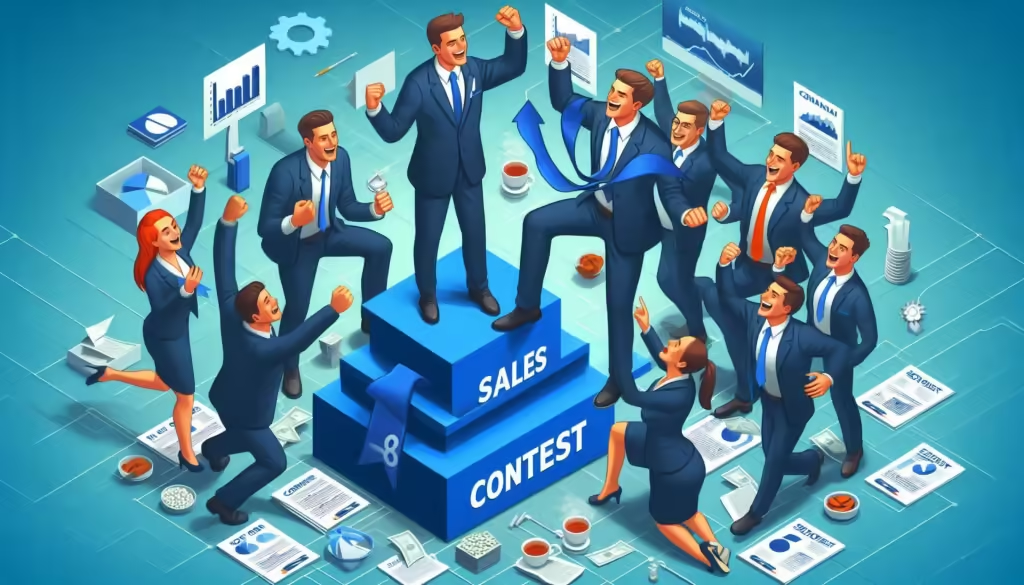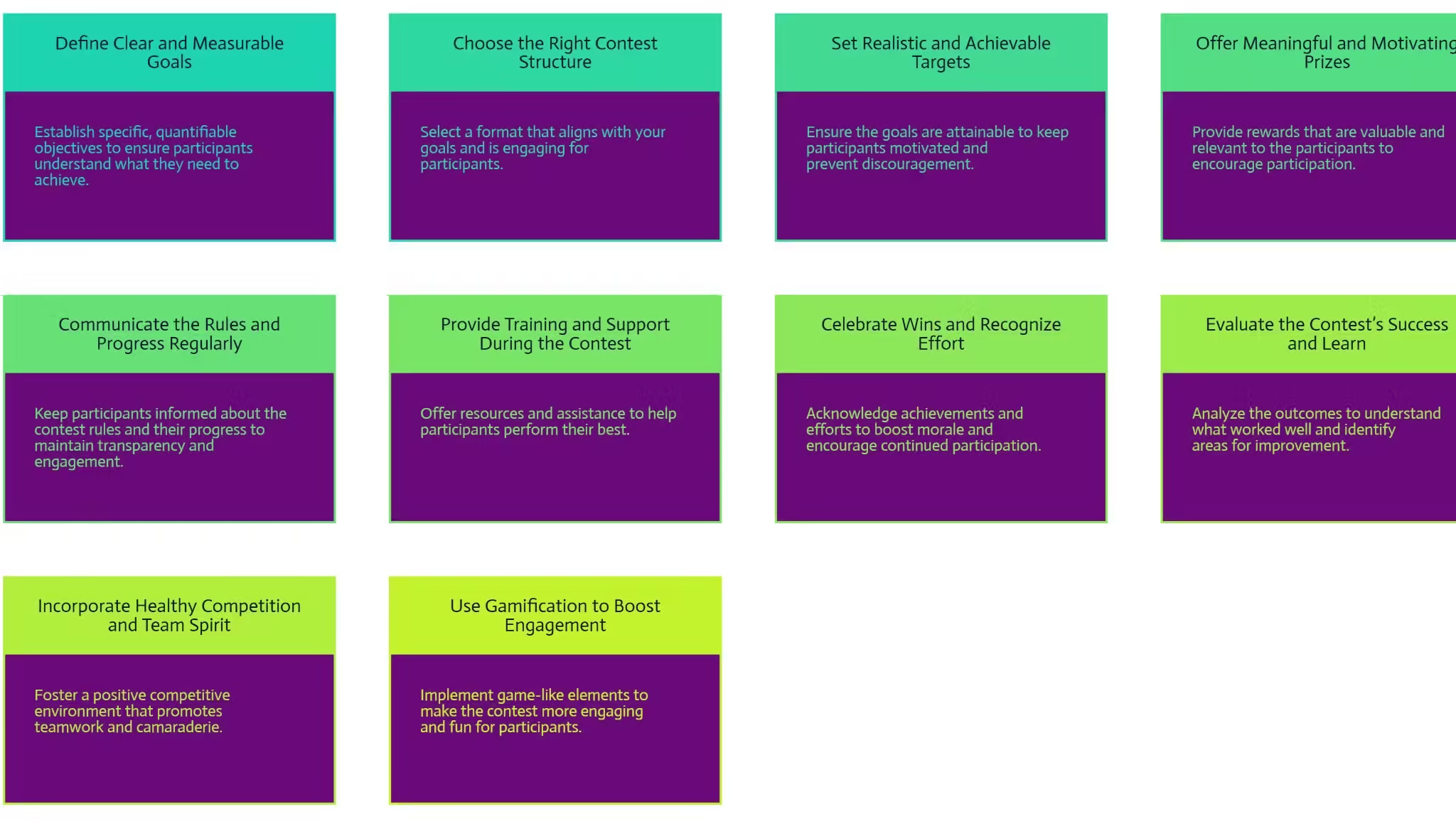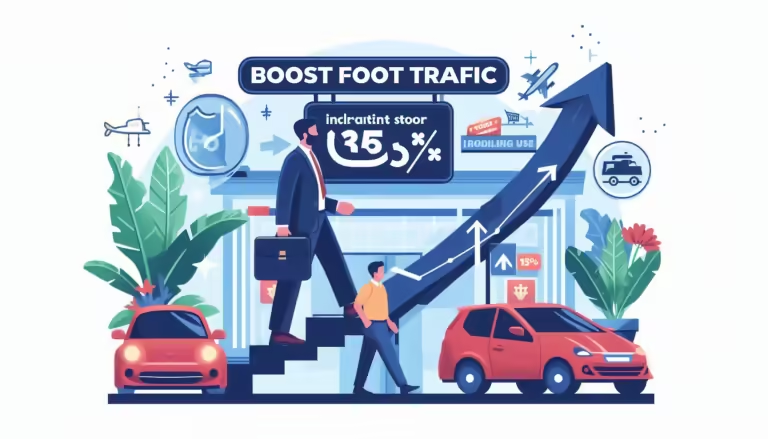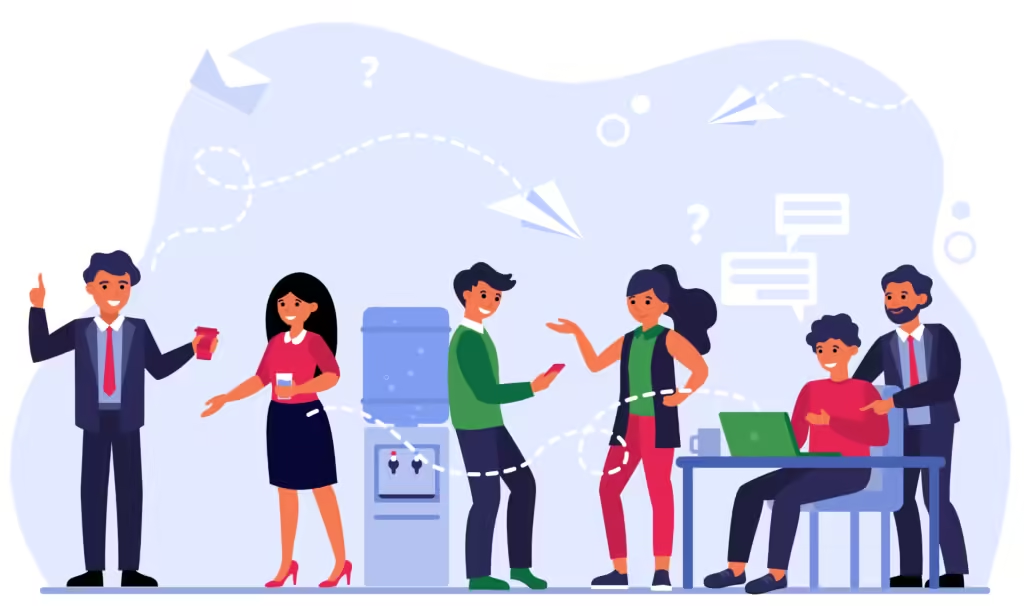How to Run a Successful Sales Contest


1. Define Clear and Measurable Goals
What It Is:
Every successful sales contest starts with a clear objective. It could be increasing sales of a new product, boosting overall revenue, getting more leads, or improving customer retention.
Why It’s Important:
Without a specific goal, the contest can become unfocused and fail to deliver measurable results. Clearly defined goals help keep participants motivated and provide a way to track success.
How to Do It:
- Identify Your Objectives: Determine what you want to achieve (e.g., increase sales by 20%).
- Set Measurable Targets: Make sure the goal is specific, like “close 10 deals” instead of “make more sales.”
- Align Goals with Business Needs: Ensure the contest supports broader company objectives.
Example:
A tech company launched a sales contest with the goal of boosting sales of their new software product by 30% over three months. The contest encouraged reps to focus on this product, leading to increased sales and market awareness.
Expert Insight:
Aaron Ross, author of Predictable Revenue, explains, “Sales contests should drive behavior that aligns with what the business needs most at that moment.”
2. Choose the Right Contest Structure
What It Is:
The structure of the contest can vary depending on your goals and team dynamics. Options include individual-based, team-based, or milestone contests (like reaching specific targets).
Why It’s Important:
The contest’s structure shapes how people participate and how rewards are earned. Different structures suit different team dynamics; for example, team-based contests encourage collaboration, while individual-based ones foster personal effort.
How to Do It:
- Individual Contests: Reward top performers (e.g., highest sales).
- Team Contests: Promote collaboration by having groups compete.
- Milestone-Based Contests: Reward participants who hit specific targets or achieve growth over time.
Case Study:
A retail company ran a milestone-based contest to reward each salesperson for hitting certain sales benchmarks. This approach motivated everyone to perform, not just the top performers, and led to a 25% sales increase overall.
Expert Insight:
Brian Tracy, sales trainer and author, advises, “The right structure keeps everyone motivated and invested from start to finish, no matter their rank or current performance.”
3. Set Realistic and Achievable Targets
What It Is:
Targets should challenge your team but also be attainable. Goals that are too ambitious can lead to frustration, while goals that are too easy won’t drive meaningful results.
Why It’s Important:
Achievable goals keep participants motivated and engaged. If targets are perceived as impossible, salespeople may lose interest and not put in their best effort.
How to Do It:
- Analyze Past Performance: Use historical data to set realistic targets.
- Factor in Market Conditions: Consider economic trends and market demand.
- Offer Tiered Targets: Provide different reward levels to engage participants with varying skill levels.
Example:
A manufacturing company set tiered targets during a sales contest, offering rewards at three different levels of achievement. This approach ensured that all reps, regardless of experience, could aim for a reward, keeping motivation high across the board.
Data Point:
According to Sales Management Association, sales contests with achievable goals are 43% more successful in driving positive team behavior.
4. Offer Meaningful and Motivating Prizes
What It Is:
The prizes you offer should be desirable to your sales team. Consider non-monetary rewards like extra vacation days, recognition at a company event, or high-value gift cards alongside cash bonuses.
Why It’s Important:
Meaningful rewards increase motivation and excitement around the contest. If prizes don’t resonate with your team, the contest won’t have the desired impact.
How to Do It:
- Survey Your Team: Ask participants what motivates them.
- Mix Rewards: Use a combination of prizes (e.g., experiences, money, recognition).
- Align with Preferences: Tailor rewards to individual interests when possible.
Example:
A SaaS company offered an all-expenses-paid trip to a tropical destination for the top performer. The grand prize created buzz, and overall participation surged.
Expert Insight:
Daniel Pink, author of Drive: The Surprising Truth About What Motivates Us, notes, “Autonomy, mastery, and purpose are strong motivators; make sure prizes align with what truly matters to your salespeople.”
5. Communicate the Rules and Progress Regularly
What It Is:
Transparency is key to running a fair and successful sales contest. Participants need to understand the rules, what’s expected of them, and how they’re performing compared to their peers.
Why It’s Important:
Clear communication eliminates confusion, builds trust, and encourages participation. Regular updates keep the excitement alive and allow reps to track their progress.
How to Do It:
- Kickoff Meeting: Hold a meeting to explain the contest rules, goals, and prizes.
- Regular Updates: Provide weekly emails or dashboards showing progress.
- Open Communication Channels: Allow participants to ask questions and seek clarification.
Case Study:
A financial services firm used a leaderboard displayed in the office and weekly emails to update reps on their standings. This transparency kept everyone engaged and striving for top spots.
Tip:
You can use automated software tools for contest tracking and provide real-time updates.
6. Provide Training and Support During the Contest
What It Is:
Running a contest isn’t just about competition; it’s also an opportunity for skill improvement. Offer training sessions to help participants reach their targets.
Why It’s Important:
Providing support ensures everyone has the tools they need to succeed. It also demonstrates your commitment to their growth, not just performance.
How to Do It:
- Workshops on Key Skills: Offer training on topics relevant to the contest goals (e.g., negotiation, lead generation).
- Mentorship Programs: Pair participants with experienced mentors.
- Open Q&A Sessions: Address questions or challenges related to the contest.
Example:
An insurance company hosted weekly sales workshops during their contest period. Reps who attended the sessions consistently outperformed those who didn’t.
Data Point:
According to HubSpot, companies with sales training integrated into contests see a 20% boost in productivity compared to those without.
7. Celebrate Wins and Recognize Effort
What It Is:
It’s important to celebrate not just the winners but all participants who made an effort. Recognition can be public or private, but it should be genuine and timely.
Why It’s Important:
Celebrating success reinforces positive behaviors and creates a culture of encouragement. It also motivates reps to participate enthusiastically in future contests.
How to Do It:
- Public Recognition: Highlight top performers at team meetings.
- Personalized Thank-You Notes: Thank each participant for their effort.
- Social Media Shout-Outs: Showcase winners and their achievements online.
Case Study:
A large retail chain used social media to announce winners and showcase their achievements. This public recognition increased engagement and participation in future contests.
8. Evaluate the Contest’s Success and Learn
What It Is:
After the contest ends, it’s crucial to analyze its impact. Review what worked well, what didn’t, and what can be improved for next time.
Why It’s Important:
This process ensures continuous improvement, making future contests even more effective. It also shows participants that their feedback matters.
How to Do It:
- Collect Feedback: Ask participants for input on the contest structure, prizes, and overall experience.
- Measure Results: Compare actual results against goals.
- Identify Best Practices: Note strategies that worked well and areas for improvement.
Example:
A software company held a debrief meeting after each sales contest. By incorporating feedback, they fine-tuned their next contests, increasing engagement and results over time.
Data Point:
Studies by Gartner show that organizations that regularly evaluate their contests improve performance metrics by 18%.
9. Incorporate Healthy Competition and Team Spirit
What It Is:
Sales contests can be designed to foster friendly rivalry among individuals while also encouraging teamwork when structured around group challenges. By promoting healthy competition, you create an environment that pushes each salesperson to do their best while celebrating collective achievements.
Why It’s Important:
While individual performance is vital, a strong sense of team spirit can boost overall morale and collaboration. Healthy competition motivates participants to excel without becoming cutthroat or overly stressful. When colleagues cheer each other on or share tips, it creates a supportive culture that benefits the entire sales team.
How to Do It:
- Team Challenges: Divide participants into teams and have them compete against each other, which encourages peer support and shared learning.
- Collaboration Rewards: Offer prizes for teamwork milestones, such as the team that collectively closes the most deals.
- Regular Team Huddles: Encourage regular team check-ins to share progress, strategies, and motivation.
Example:
A marketing firm ran a month-long sales contest with both individual and team-based components. Individual top performers were recognized, but team achievements had extra rewards, like a team dinner or group experience. This dual approach increased engagement, camaraderie, and productivity.
Expert Insight:
Dr. Heidi Grant, a social psychologist and author of Reinforcements: How to Get People to Help You, says, “The most successful teams blend personal ambition with the desire to lift the group, creating a powerful force for collective achievement.”
10. Use Gamification to Boost Engagement
What It Is:
Gamification involves applying game-like elements to your contest, such as points, badges, levels, and leaderboards. This approach taps into people’s innate desire to compete, achieve, and earn recognition.
Why It’s Important:
Gamification makes sales contests more engaging and fun. By adding interactive elements, you capture participants’ attention and encourage them to stay motivated throughout the contest. Gamification can also provide a sense of progress and accomplishment, even for those who aren’t the absolute top performers.
How to Do It:
- Point-Based System: Assign points for different activities (e.g., calls made, deals closed) and reward different achievements.
- Leaderboard Updates: Create a visual leaderboard that tracks progress in real-time, allowing reps to see where they stand.
- Level Up Challenges: Introduce stages or levels, with progressively harder challenges and corresponding rewards.
Case Study:
A SaaS company implemented a gamified sales contest where each sales activity—such as securing meetings, making presentations, and closing deals—earned points. Reps could exchange their points for various rewards. The gamified approach significantly increased engagement, and reps reported enjoying the friendly rivalry.
Tip:
To maximize impact, use software tools designed for gamification. They can automate tracking, create excitement, and offer engaging visuals.
Data Point:
A study by Salesforce found that companies using gamification techniques experience a 20% improvement in sales productivity.
Expert Insight:
Gabe Zichermann, a leading gamification expert, notes, “Gamification engages people on an emotional level and makes them more motivated to achieve their goals, even in traditionally demanding environments like sales.”
Conclusion: How to Run a Successful Sales Contest
FAQs
It’s a competition where salespeople compete to achieve specific sales goals, with rewards for top performers to keep them motivated.
Sales contests boost motivation, improve sales performance, encourage teamwork, and help achieve specific business goals quickly.
Set clear, realistic, and measurable goals based on what you want to achieve, like increasing sales of a product or closing more deals.
Offer rewards that excite your team, such as cash bonuses, gift cards, trips, recognition, or extra days off. Ask your team what they like!
It depends on your goals. Individual contests motivate personal performance, while team-based ones build collaboration and teamwork.
It should be long enough to make an impact but not too long that it becomes boring. Usually, contests run for a few weeks to a few months.
Provide regular updates, offer encouragement, use leaderboards, and celebrate progress to keep excitement high throughout the contest.
Create rules that give everyone a chance to win, like tiered goals or different challenges for new and experienced salespeople.
Use leaderboards, dashboards, or weekly updates to show how participants are doing and keep them aware of their standing.
Celebrate winners, recognize everyone’s effort, and review what worked and what didn’t so you can improve future contests.
Share this post




Chiranjeev Jaiswal
Chiranjeev Jaiswal (M.B.A. and P.G.D.M.in Marketing from IM-BHU) launched "Vibrant Marketer" out of a deep passion for all things marketing. After years of working in the industry, he realized that marketing success isn’t about following the same playbook—it’s about staying ahead of the curve and thinking outside the box.












